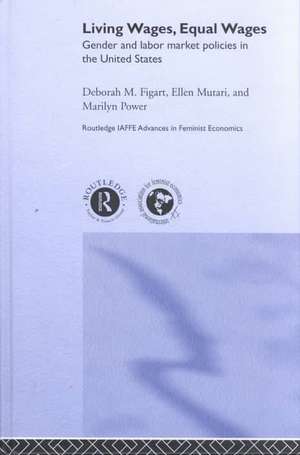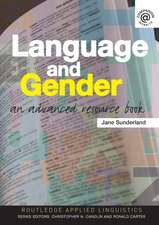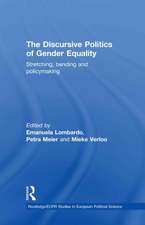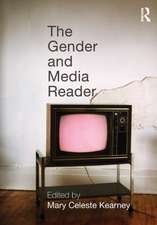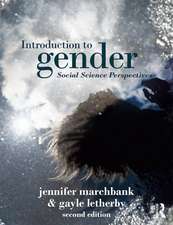Living Wages, Equal Wages: Gender and Labour Market Policies in the United States: Routledge IAFFE Advances in Feminist Economics
Autor Deborah M. Figart, Ellen Mutari, Marilyn Poweren Limba Engleză Hardback – 23 mai 2002
The controversial issue of establishing living wages for all workers makes this book both a timely and indispensable contribution to this wide ranging debate, and it will surely become required reading for anyone with an interest in modern economic issues.
| Toate formatele și edițiile | Preț | Express |
|---|---|---|
| Paperback (1) | 428.72 lei 6-8 săpt. | |
| Taylor & Francis – 23 mai 2002 | 428.72 lei 6-8 săpt. | |
| Hardback (1) | 1045.42 lei 6-8 săpt. | |
| Taylor & Francis – 23 mai 2002 | 1045.42 lei 6-8 săpt. |
Din seria Routledge IAFFE Advances in Feminist Economics
-
 Preț: 298.11 lei
Preț: 298.11 lei - 31%
 Preț: 428.72 lei
Preț: 428.72 lei - 15%
 Preț: 424.03 lei
Preț: 424.03 lei - 23%
 Preț: 306.26 lei
Preț: 306.26 lei - 15%
 Preț: 464.71 lei
Preț: 464.71 lei - 15%
 Preț: 524.90 lei
Preț: 524.90 lei - 15%
 Preț: 464.36 lei
Preț: 464.36 lei - 15%
 Preț: 496.88 lei
Preț: 496.88 lei -
 Preț: 376.97 lei
Preț: 376.97 lei -
 Preț: 460.17 lei
Preț: 460.17 lei - 22%
 Preț: 462.55 lei
Preț: 462.55 lei -
 Preț: 496.50 lei
Preț: 496.50 lei -
 Preț: 444.23 lei
Preț: 444.23 lei - 15%
 Preț: 420.77 lei
Preț: 420.77 lei - 17%
 Preț: 272.02 lei
Preț: 272.02 lei - 26%
 Preț: 764.62 lei
Preț: 764.62 lei -
 Preț: 358.48 lei
Preț: 358.48 lei -
 Preț: 367.04 lei
Preț: 367.04 lei -
 Preț: 367.04 lei
Preț: 367.04 lei - 18%
 Preț: 1002.46 lei
Preț: 1002.46 lei
Preț: 1045.42 lei
Preț vechi: 1405.89 lei
-26% Nou
Puncte Express: 1568
Preț estimativ în valută:
200.20€ • 204.30$ • 168.44£
200.20€ • 204.30$ • 168.44£
Carte tipărită la comandă
Livrare economică 25 februarie-11 martie
Preluare comenzi: 021 569.72.76
Specificații
ISBN-13: 9780415273909
ISBN-10: 0415273900
Pagini: 276
Ilustrații: 17 tables
Dimensiuni: 156 x 234 x 18 mm
Greutate: 0.61 kg
Ediția:1
Editura: Taylor & Francis
Colecția Routledge
Seria Routledge IAFFE Advances in Feminist Economics
Locul publicării:Oxford, United Kingdom
ISBN-10: 0415273900
Pagini: 276
Ilustrații: 17 tables
Dimensiuni: 156 x 234 x 18 mm
Greutate: 0.61 kg
Ediția:1
Editura: Taylor & Francis
Colecția Routledge
Seria Routledge IAFFE Advances in Feminist Economics
Locul publicării:Oxford, United Kingdom
Recenzii
'This book addresses an issue that is particularly timely after years of growing income inequality and draconian decreases in welfare support for single mothers which is likely to work increasing hardship as unemployment rises. The authors deserve credit for making it clear throughout that their concern is not so much with economics, as practised by neoclassical economists, as with political economy. The difference, as they make clear, is that the former takes full cognizance of the importance of social conditions and government policies, not merely market forces, in determining wages. This is an important lesson for an economics profession that has tended to resist any efforts to improve upon a wage structure that rewards some with riches beyond the dreams of avarice and leaves others destitute.' - Marianne Ferber, Professor Emerita, University of Illinois, USA
'Moving from early twentieth-century struggles over minimum wages for both the woman worker and male breadwinner and post-World War II attempts at equal pay through job evaluation and legislation onto recent battles for comparable worth and the living wage, Figart, Mutari, and Power unmask wage setting as a central vehicle for institutionalizing gender and race inequality in the United States. Their focus on the wage as a living, as a price, and as a social practice demistifies the labor market process at a time when employment has replaced income assistance as the goal of welfare policy. Full of theoretical sophistication and historical insight, Living Wages, Equal Wages is feminist political economy at its best.' - Eileen Boris, Hull Professor of Women's Studies, University of California, Santa Barbara, USA
'This well-written book should be adopted in a variety of classes ... Figart, Mutari, and Power ... are very convincing that a feminist wage determination scenario must use wages not only as a price but also as a living and as a social practice for a satisfactory explanation of industrial working conditions of men and women.' - David H. Ciscel, Journal of Economic Issues
'This book addresses an issue that is particularly timely after years of growing income inequality and draconian decreases in welfare support for single mothers which is likely to work increasing hardship as unemployment rises. The authors deserve credit for making it clear throughout that their concern is not so much with economics, as practised by neoclassical economists, as with political economy. The difference, as they make clear, is that the former takes full cognizance of the importance of social conditions and government policies, not merely market forces, in determining wages. This is an important lesson for an economics profession that has tended to resist any efforts to improve upon a wage structure that rewards some with riches beyond the dreams of avarice and leaves others destitute.' - Marianne Ferber, Professor Emerita, University of Illinois, USA
'Moving from early twentieth-century struggles over minimum wages for both the woman worker and male breadwinner and post-World War II attempts at equal pay through job evaluation and legislation onto recent battles for comparable worth and the living wage, Figart, Mutari, and Power unmask wage setting as a central vehicle for institutionalizing gender and race inequality in the United States. Their focus on the wage as a living, as a price, and as a social practice demistifies the labor market process at a time when employment has replaced income assistance as the goal of welfare policy. Full of theoretical sophistication and historical insight, Living Wages, Equal Wages is feminist political economy at its best.' - Eileen Boris, Hull Professor of Women's Studies, University of California, Santa Barbara, USA
'This well-written book should be adopted in a variety of classes ... Figart, Mutari, and Power ... are very convincing that a feminist wage determination scenario must use wages not only as a price but also as a living and as a social practice for a satisfactory explanation of industrial working conditions of men and women.' - David H. Ciscel, Journal of Economic Issues
'This book addresses an issue that is particularly timely after years of growing income inequality and draconian decreases in welfare support for single mothers which is likely to work increasing hardship as unemployment rises. The authors deserve credit for making it clear throughout that their concern is not so much with economics, as practised by neoclassical economists, as with political economy. The difference, as they make clear, is that the former takes full cognizance of the importance of social conditions and government policies, not merely market forces, in determining wages. This is an important lesson for an economics profession that has tended to resist any efforts to improve upon a wage structure that rewards some with riches beyond the dreams of avarice and leaves others destitute.' - Marianne Ferber, Professor Emerita, University of Illinois, USA
Notă biografică
Deborah M. Figart is Professor of Economics at Richard Stockton College, New Jersey., Ellen Mutari is Assistant Professor of General Studies at Richard Stockton College, New Jersey., Marilyn Power is a member of the Faculty of Economics at Sarah Lawrence College, New York.
Cuprins
Part One: Laying the Groundwork: Methodological Frameworks and Theoretical Perspectives 1. Living Wages, Equal Wages, and the Value of Women's Work 2. Waged Work in the Twentieth Century 3. Two Faces of Wages Within the Economics Tradition: Wages as a Living, Wages as a Price 4. The Third Face: Wages as a Social Practice Part Two: Wage Regulations in the Twentieth Century 5. An Experiment in Wage Regulation: Minimum Wages for Women 6. A Living for Breadwinners: The Federal Minimum Wage 7. Job Evaluation and the Ideology of Equal Pay 8. Legislating Equal Wages Part Three: The Century Ahead 9. Living Wages, Equal Wages Revisited: Contemporary Movements and Policy Initiatives 10. Applying Feminist Political Economy to Wage Setting
Descriere
Focusing on social reform movements for living wages and equal wages, this informative and accessible book explores how US wage regulations in the twentieth century took gender, race-ethnicity and class into account.
